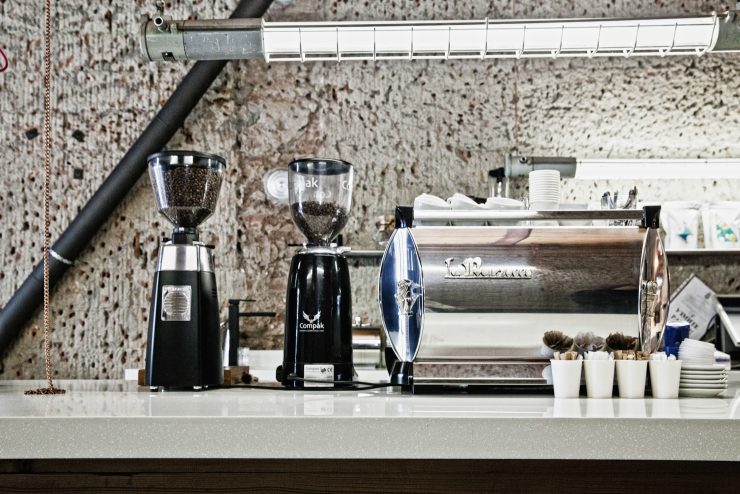
Specialty coffee is catching on in Belgrade, Serbia, and it all started at Pržionica D59B. Founders Slavko Marković, Andrija Erić, and Marko Basarovski opened the cafe and started roasting four years ago in Belgrade’s Lower Dorćol district. The concept was intentionally simple: coffee and water. No tea, no food, no frills. The concrete walls, tile floors, and wooden benches that frame this living-room-sized cafe echo the founders’ commitment to the basics. There are no fancily-chalked menus either; just a single A4 sheet taped to the cafe’s spotless white communal table where locals gather to drink impeccable coffee and listen to eclectic DJ sets.
Pržionica D59B is located in the former industrial section of Dorćol, a landscape of monumental warehouses, chain-link fences, and overgrown lots, accented with Belgrade’s signature cracked and buckling sidewalks. The micro-roaster’s own spot on Dobračina road used to be a state-owned bus garage when Serbia was still part of Yugoslavia. But in the last decade, a generation of young Serbs has invested in the area, opening restaurants, clubs, cafes, and boutiques that pulsate with life amidst the drab concrete.
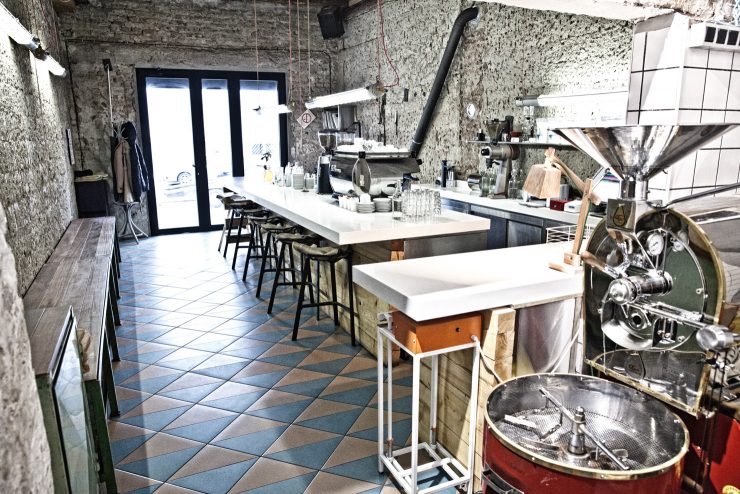
On the Friday afternoon I stop by, Pržionica D59B is packed with couples, friends, and even a few moms with well-behaved kids trailing behind. Laughter, the hum of the roaster, and the grinding, steaming, and clinking of a barista at work mingle with electronic music being piped over the sound system. “People never used to come to this area, but now it offers a peaceful break from the busy downtown,” says barista Nenad Stojanović.
Stojanović has me taste an Ethiopian pour-over while we talk about the growing presence of Third Wave coffee in Belgrade. Winner of the 2016 Serbian Barista Championship, Stojanović has spent time working in Austria and traveling to coffee-forward countries to learn from people he considers more experienced. Like other southern European countries, Belgrade suffers from the hegemony of Italian coffee giants that impose low-quality, over-roasted beans, but with a regional twist: Serbia is one of the largest consumers of Turkish-style coffee. The combination is often bitter and intense, but not in a nice way. Stojanović puts it bluntly: “We drink bad coffee in southern Europe.”
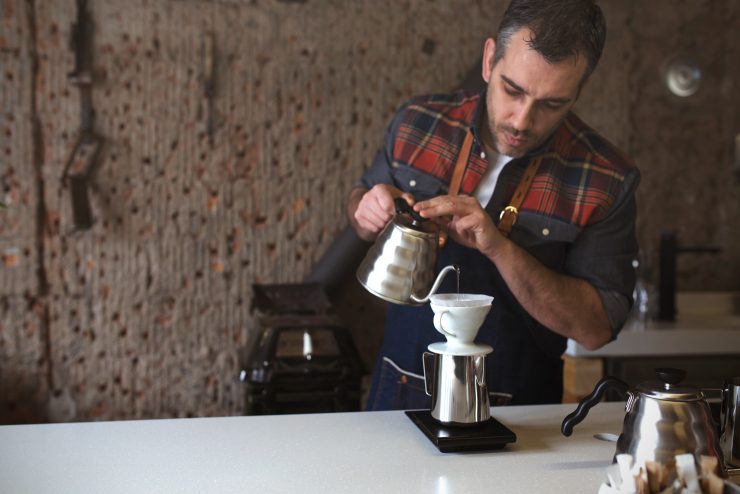
But as he points out, it doesn’t have to be that way. Pržionica D59B’s house roasts include a slightly darker Brazil-sourced arabica blend developed specifically for Turkish-style brewing, which is sold to cafes and restaurants around the city. The challenge has been convincing customers to accept a different flavor profile in their cups. “It can be hard to explain to people that something more acidic, for example, can be pleasurable,” Stojanović says. Head roaster Erić and the five-kilogram machine he fills with beans from 32Cup or Trabocca are visible from the seating area, giving customers the chance to witness part of what goes into getting bean to cup.
The other challenge facing Pržionica D59B and other businesses, coffee-related or otherwise, is Serbia’s status as a non-EU country. “It’s more expensive to import coffee beans to Serbia than to Germany, for example,” explains Stojanović. “But an espresso there costs €2.50, while here it is still only €1.” It’s easy to forget Belgrade is a city where the average monthly salary is €300 and red tape is omnipresent.
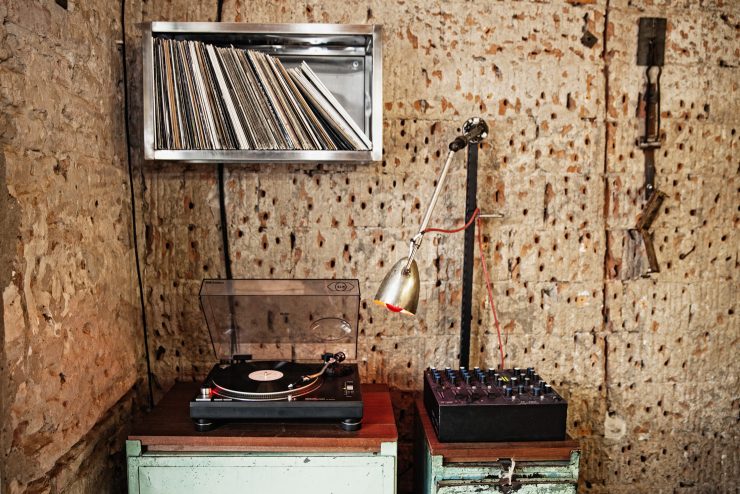
In a corner of the cafe, above the La Marzocco GB5 machine, hangs a Funktion One speaker, proof that Pržionica D59B takes music as seriously as it does coffee. Erić is also a DJ and producer, and he’s managed to combine his two passions, coffee and music here: Soul Print Recordings operates out of the cafe and has produced four albums to date. “That’s kind of a big deal for a Serbian label,” Erić says with a laugh.
A remodel last summer prepared the cafe to welcome a new weekly event: Sunday DJ sets with local and international talent. The parties draw crowds thick enough to block Dobračina road, which is impressive for a coffee shop, but not really surprising if you know a little bit about Belgrade’s infatuation with parties: what the city lacks in architectural splendor, it makes up for with a charismatic social scene and incredible music events.
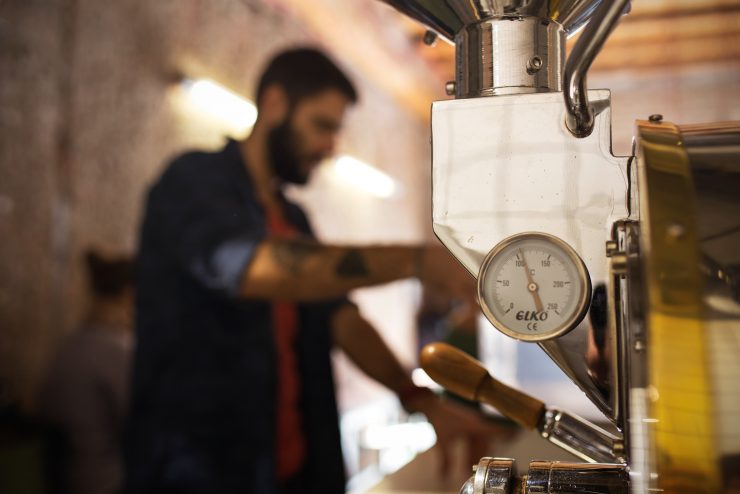
The Sunday sets by Belgrade-based DJs like DJP and Akioki and special guests including London’s Jane Fitz, who played in March, are recorded and uploaded to Soundcloud under the name Drip Podcast and played throughout the week at the cafe.
As we finish our conversation, Stojanović takes a break from cleaning his workspace to put on his favorite vinyl by Melchoir Sultana: “We wanted to bring something new to the Belgrade music scene like we did with coffee four years ago.”
Pržionica D59B is located at Dobračina 59, Belgrade, Serbia. Follow them on Tumblr.
Kate Robinson (@KateOnTheLoose) is a freelance journalist based in Paris. Read more Kate Robinson on Sprudge.
Photos courtesy of Sandra Draganov, Branko Koljajic, and Vladimir Miladinovic.
The post Belgrade Rising: Coffee At Pržionica D59B appeared first on Sprudge.

